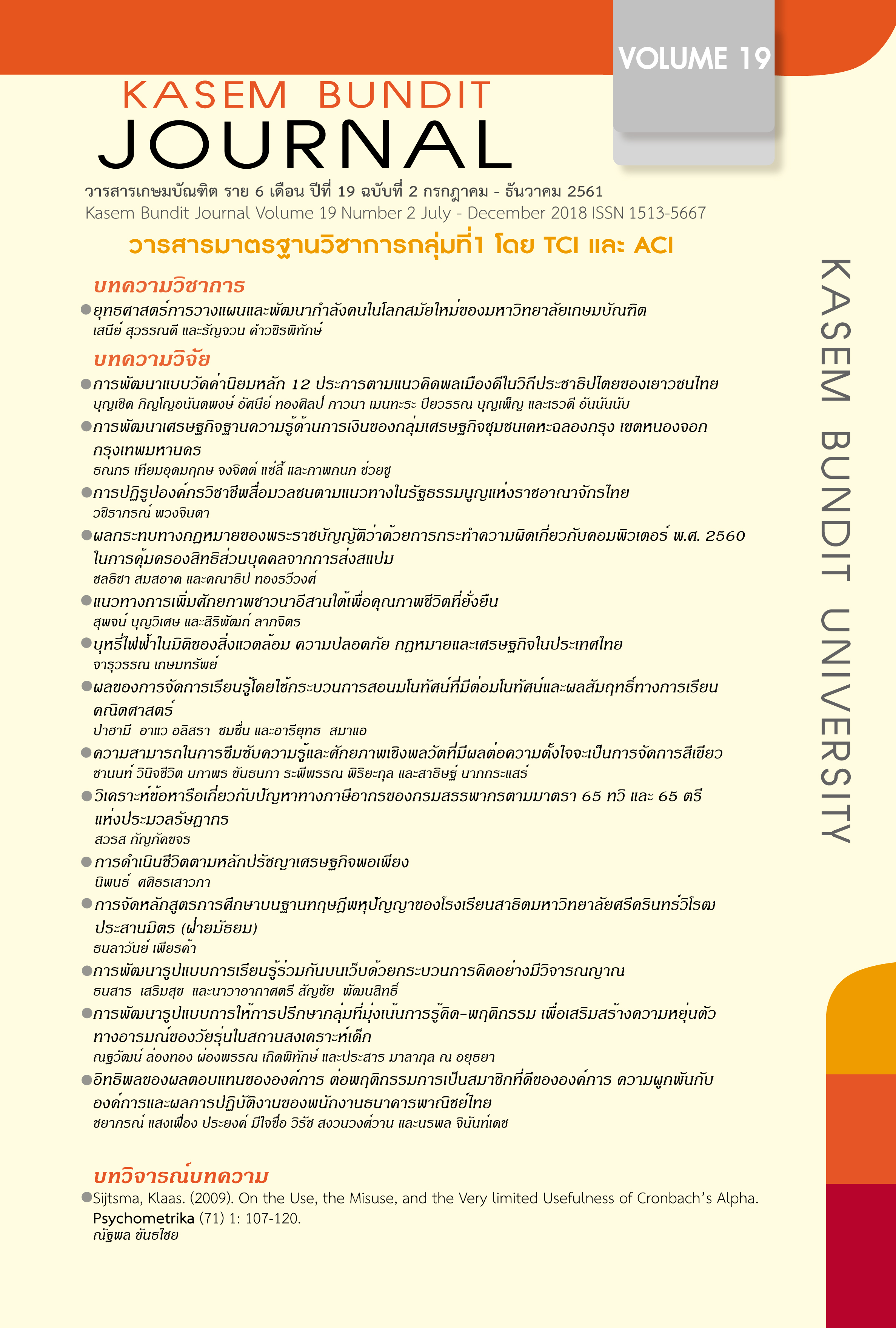การพัฒนารูปแบบการให้การปรึกษากลุ่มที่มุ่งเน้นการรู้คิด-พฤติกรรม เพื่อเสริมสร้างความหยุ่นตัวทางอารมณ์ของวัยรุ่นในสถานสงเคราะห์เด็ก
คำสำคัญ:
การให้การปรึกษากลุ่มที่มุ่งเน้นการรู้คิด-พฤติกรรม ความหยุ่นตัวทางอารมณ์ วัยรุ่นในสถานสงเคราะห์เด็กบทคัดย่อ
การวิจัยนี้มีวัตถุประสงค์เพื่อพัฒนารูปแบบการให้การปรึกษากลุ่มที่มุ่งเน้นการรู้คิด-พฤติกรรม เพื่อเสริมสร้างความหยุ่นตัวทางอารมณ์ของวัยรุ่นในสถานสงเคราะห์เด็ก ประชากรที่ศึกษาเป็นวัยรุ่นในสถานสงเคราะห์เด็ก เขตกรุงเทพมหานครและปริมณฑล จำนวน 164 คน และกลุ่มตัวอย่างที่เข้าร่วมการทดลอง จำนวน 48 คน แบ่งเป็น กลุ่มทดลอง จำนวน 2 กลุ่ม คือ กลุ่มวัยรุ่นชาย 12 คน และกลุ่มวัยรุ่นหญิง 12 คน และกลุ่มควบคุมจำนวน 2 กลุ่มคือ กลุ่มวัยรุ่นชาย 12 คน และกลุ่มวัยรุ่นหญิง 12 คน การวิจัยนี้เป็นการวิจัยแบบผสานวิธี และใช้ Nonparametric statistics ในการวิเคราะห์ข้อมูล ผลการวิจัยสรุปได้ดังนี้ วัยรุ่นในสถานสงเคราะห์เด็กมีความหยุ่นตัวทางอารมณ์โดยรวมอยู่ในระดับปานกลาง รูปแบบการให้การปรึกษากลุ่มที่มุ่งเน้นการรู้คิด-พฤติกรรมที่พัฒนาขึ้น ประยุกต์ใช้แนวคิดและเทคนิคของทฤษฎีที่มุ่งเน้นการรู้คิด-พฤติกรรมเพื่อสำรวจอารมณ์ ความคิด พฤติกรรม และจัดการกับความคิด อารมณ์และพฤติกรรมที่ไม่เหมาะสม ผลการเสริมสร้างความหยุ่นตัวทางอารมณ์ของวัยรุ่นกลุ่มทดลองพบว่า วัยรุ่นกลุ่มทดลองมีความหยุ่นตัวทางอารมณ์โดยรวมระหว่างหลังการทดลอง-ก่อนการทดลอง และระหว่างหลังการติดตามผล-ก่อนการทดลอง อย่างมีนัยสำคัญ กลุ่มทดลองและกลุ่มควบคุม หลังการทดลองและหลังการติดตามผลมีความหยุ่นตัวทางอารมณ์โดยรวมแตกต่างกันอย่างมีนัยสำคัญทางสถิติที่ระดับ .001 ผลการสนทนากลุ่มเฉพาะพบว่า กลุ่มวัยรุ่นหญิงรู้สึกพอใจมากและสนุก มีโอกาสแลกเปลี่ยนความคิด ความรู้สึก ประสบการณ์ที่เกี่ยวข้องกับอารมณ์ และรู้จักอารมณ์ตนเองมากขึ้น ได้เรียนรู้วิธีปรับอารมณ์ตนเอง มีสติมากขึ้นเมื่อโกรธหรือทะเลาะกับเพื่อน ส่วนกลุ่มวัยรุ่นชายรายงานว่า กิจกรรมการให้การปรึกษากลุ่มช่วยให้มีความเชื่อมั่นในการจัดการอารมณ์และพฤติกรรมของตนเอง และมีความหยุ่นตัวทางอารมณ์เพิ่มขึ้น สามารถระงับความโมโห และความโกรธที่มากเกินไปได้
เอกสารอ้างอิง
Bernard, M. E. (2002). Emotional Resilience: Implications for You Can Do It! Education Theory and Practice. https://www.youcandoiteducation.com/reflectionsone- motional_files/ReflectionsOnEmotional.pdf Accessed 18 August 2014.
Bernard, M.E. (2006). Providing all children with the foundations for achievement, well-being and positive relationship. (3rd ed.). Oakleigh, Vic: Australian Scholarships Group.
Bernard, M. E. (2008). The effect of You Can Do It! Education on the emotional resilience of primary school students with social, emotional, behavioural and achievement challenges. In 43rd APS annual conference proceedings, Hobart, Australia.
Children and adolescents (2000). Vision for Child and Youth Welfare Department, Department of Public Welfare. (reproduce)
Gazda, G. M., Ducan, J. A., & Meadows, M. E. (1967). Group in Counseling and Group Procedures: Reported of a Survey in Counselor Education and Supervision. Boston: Houghton Mifflin.
Harvey, V. S. (2007). School wide methods for fostering resiliency. Student Services, 10-14. United Nations Association in Canada. Retrieved from www.naspcenter.org/principals
Herald, M. (2014). Stepping Stones to Emotional Resilience: A Guide to Embracing Your Inner Strength. Resilient Living Publications.
Hromek, R. (2005). Game time: Games to promote social and emotional resilience for children aged 4-14. London; Thousand Oaks, Calif. : Paul Chapman.
Kirdpitak P. (2011). Course 25711: Concepts of Guidance & Theory in Psychological Counseling (1st ed.) Nonthaburi: Sukhothai Thammathirat University.
Office of Welfare and Child Protection, Youth and the Elderly Ministry of Social Development and Human Security. (2013). The study on violence against children Volume 5 children in the Foster Home. Bangkok.
Petrocelli, J. V. (2002). Effectiveness of Group Cognitive Behavioral Therapy for General Symptomatology : A Meta-analysis. Journal for Specialists in Group Work. 27(1), 92-115.
Roopkamdee W. (2010). Development of child behavior in the Foster Home case study: Ban Mahmuk boys home. Learning Center for Social Development and Welfare Ministry of Social Development and Human Security.
Taywintonpakdee K. (2000). Alternative education by study center in a shelter. Bangkok: príkwăan graphic.
ดาวน์โหลด
เผยแพร่แล้ว
รูปแบบการอ้างอิง
ฉบับ
ประเภทบทความ
สัญญาอนุญาต
Any views or opinions expressed in this issue of the Kasem Bundit University Journal are those of the authors alone and do not necessarily reflect the views or opinions of Kasem Bundit University or the editors.







